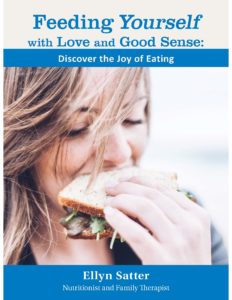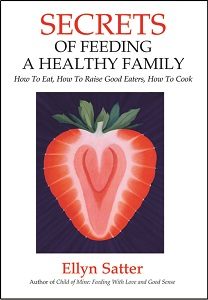

Family Meals Focus
The Ellyn Satter Institute Newsletter
Addressing the epidemic of dysfunctional eating
Ellyn Satter, MS, MSSW, Nutritionist and Family Therapist
For a PDF of this article, click here
Learning How to Eat provides you with a concise and reliable method to restore your patients’ trust in their hunger, appetite, and satiety. The intervention I have taught for 30 years to hundreds of professionals has been demonstrated to be effective with the diffuse population who caught in the misery of a struggle with eating and weight.1,2
The dieting casualty is an obligatory dieter
Today’s dieting casualty is not just about an constant and futile struggle with weight. It is about being locked in conflict between good-food-bad-food and experiencing eating as unrelenting misery and shame. At the same time as they strive to live by the credo, “don’t eat so much; don’t eat the foods you like,” today’s obligatory dieters aren’t even aware that they have been enslaved by food restriction. Their often vague but cruel self-expectations about eating leave them so insensitive to and mistrustful of their wants and needs with eating that they can only respond to extremes of hunger, food craving, and fullness. While their struggle with eating plays a central role in life, they aren’t eating disordered.
Presenting complaints
ESI faculty members’ list the presenting complaints of their patients whom they helped with How to Eat. Here are some of the people I have helped to relieve their conflict and anxiety about eating and eat in a way that is and rewarding for them.
- When she went off to college, Ashley was bewildered and immobilized with feeding herself.
- Rita had such an aversion to eating that she could eat only when extreme hunger drove her.
- Patty’s picky eating was so severe that she no longer ate in public.
- Mary spent feverish and fearful hours in grocery stores seeking “healthy” food.
- Since that first “heart-healthy” diet 40 years ago, Sarah had hated cooking and eating.
- Joseph was demoralized and defeated about controlling his diabetes.
Based on Eating Competence, confidently help others to experience joyful and rewarding eating.
Keira Oseroff, MSSW, eating disorders specialist
- I believe I have no self-control/discipline/willpower.
- I feel embarrassed to eat with others and fear others will judge me if I eat as much as I want.
- “I don’t think I should need as much as I want!”
- I worry I will always be preoccupied with food/my weight/my body.
Cristen Harris, PhD, RDN, eating disorders specialist
- Linda was ashamed of her binge eating.
- Lucy felt undeserving of beautiful food.
- Lila felt ashamed of having anyone see her eat.
Alexia Beauregard, MS, RDN, military wellness
- Alicia was told by her doctor that she needs bariatric surgery, and this is her only long-term solution for weight management. She is adamantly opposed to it. She is tired of diets that don’t work and doctors that only focus on her weight. She doesn’t care what the scale says, she just wants to be healthy and feel comfortable in her skin.
- Curtis said he has struggled with his weight his entire life. He has lost weight in the past by following extremely low-calorie diets, but he always gains it back when he starts to eat “normally” again. He is tired of the yo-yo and knows that this is not good for his health. He just wants to be able to eat and not constantly think about food and his weight.
Rebeca Hernandez, MS, LD private eating and feeding practice
- I feel guilty about what I really want to eat.
- Mealtimes are torture for me. I don’t like cooking; I prepare things I am not supposed to eat. I always feel guilty, thinking that I should be preparing and eating something else.
- There’s always a point in which I can’t eat “healthy” anymore, I can’t take it anymore. I hate eating everything I am supposed to eat.
- I am at war with vegetables. I hate salads, I am tired of eating “healthy.” When I eat “healthy” I am anxious all the time.
- I lose weight, but there is a point when I want to eat what I want. So I eat “junk” and I go back up. I have no middle ground. Plus, I feel guilty all the time.
- I am constantly plagued by hunger and food cravings. My doctor tells me I am perfectly healthy, but eating and not-eating are always on my mind. My 5-year-old daughter told me the other day when I was drinking diet Coke, that diet drinks are the drinks mothers drink, because mothers are always dieting. I don’t want her to learn this.
- I have battled with my weight ever since I can remember, I think I’ve seen 70 RDs or more. Eating is always a source of stress, a struggle.
- I am a chef, and I stopped cooking at home, because I cook what I am not supposed to eat! I can’t enjoy a Risotto or bread in peace. If I cook it I binge. I can’t trust my instincts with food.
Do you have people like these in your practice? Do you do you want to help them regain trust and comfort with their natural ability to eat as much as they want of food they enjoy? Reach out confidently to them and allow them to experience eating as joyful and rewarding. How to Eat teaches you to assess, then systematically and progressively apply evidence-based cognitive and behavioral techniques to 1) Resolve conflict and anxiety about eating and to 2) Build attuned, stable, and positive eating attitudes and behaviors.
References
- Harris C, Estes P, Satter E. Feasibility of Using Satter’s How to Eat Method to Improve Eating Competence Among Previous Dieters in a Metropolitan Hospital System Employee Wellness Program. Current Developments in Nutrition. 2020;4(Supplement_2):1307-1307.
- Harris C, Crum P, Satter E. Feasibility of Satter’s How to Eat Method Using Two Delivery Modes to Improve Eating Competence Among Previous Dieters in a University Employee Wellness Program. Current Developments in Nutrition. 2020;4(Supplement_2):1306-1306.
Ellyn Satter’s Secrets of Feeding a Healthy Family says the secret of raising a healthy eater is to love good food, enjoy eating, and share that love and enjoyment with your child. When the joy goes out of eating, nutrition suffers.



